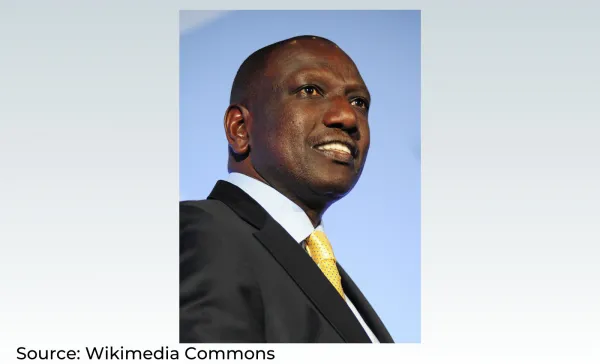By: Ishita Goel J
April 24 2023

The Kenyan President said that oil importers would be able to use shillings for their dealings, freeing up more U.S. dollars for circulation.
Context
Kenya witnessed anti-government protests in March against the rise in the cost of living as the country found itself in the middle of an economic crisis with inflation hitting 9.2 percent in February 2023. An AFP report stated that a record drought left millions hungry, and the upcoming rainy season is predicted to fail. COVID-19 and the Russia-Ukraine war have also contributed to the crisis.
Following such developments, Kenyan President William Ruto addressed the country on March 22 regarding plans to import oil using shillings causing a surge in misleading posts on social media. A video clip of Ruto viral on social media has users claiming that he is urging people to dump and dispose of U.S. dollars because they would soon become worthless owing to the global currency collapse. Some also used the clip to claim that he was saying that Kenya would soon eliminate U.S. dollars. In the viral clip, Ruto says, "I am giving you free advice that those of you who are holding dollars, you certainly might go into losses. You better do what you must do because this market is going to be different in a couple of weeks."
In Fact
According to a report by Deutsche Welle, Kenya has been facing a dollar shortage, causing some fuel and oil importers to claim they cannot import the goods owing to the low availability of foreign currency. Kenya's oil and fuel importers use U.S. dollars to buy fuel, causing the shortage of foreign currency to also impact the imports of essential goods such as medicines and food.
However, on March 10, Kenya sealed a deal with Saudi Arabia and the United Arab Emirates to import oil products for six months on credit terms, stated NTV Kenya. Kenya's Energy Cabinet Secretary, Davis Chirchir, announced that international oil companies will be free to make payments using the Kenyan Shilling "to ease spot pressure on the dollar".
We found the original video of Ruto's speech published by NTV Kenya on March 22, 2023, on YouTube, titled, "Ruto speaks on dollar shortage, promises to protect businesses amid opposition protests." In the video, at 1:12 timestamp, we can see Ruto assuring citizens who are facing issues accessing dollars. "...We have taken steps to ensure that the dollar availability in the next couple of weeks is going to be very different because our fuel companies will now be paying for fuel in Kenya shillings. They do not have to look for dollars every month because we have done what we must do as a government to ensure we ease the burden on people who want to realize their returns in dollars," Ruto said, speaking about the import deal. The viral clip is a small part of his complete speech and misses key points from his address.
Therefore, rather than predicting a global collapse of U.S. dollars or saying he would be getting rid of U.S. dollars in Kenya, Ruto spoke about an increase in availability in dollars in the coming weeks. His comment about those hoarding dollars suddenly going into losses came in light of the fact that there would be a decrease in local demand for the U.S. dollar.
The Verdict
Ruto did not imply that his country would stop using U.S. dollars or that they would become worthless. Instead, he said that fuel companies would begin using Kenya shillings for fuel imports, thereby easing demand for U.S. dollars. Therefore, we have marked the claim false.